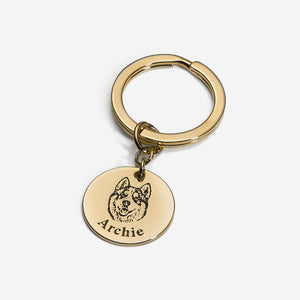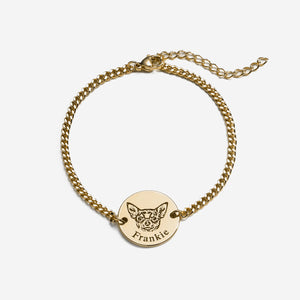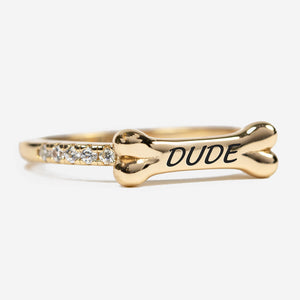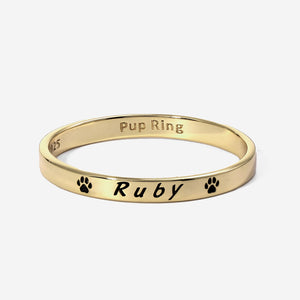“What do you think Cookie thinks about?” Or “ What do you think he dreams about?”
My response is always different, but my curiosity for the real answer has been growing over time, so here we are!
I look down at Cookie and wonder the same: What does he think about? When he’s laying around the apartment, what’s on his mind? When he looks at me and wags his tail, what’s going through his head? And when he’s asleep and his legs start twitching as he lets out a few gently whispered “woofs”- What is my dog dreaming about?
If you’ve never wondered about it, I bet you are now! What’s going on in your little pup’s head? While we can’t read their minds, there is a ton we know about how they work. Here are _ facts about your dog’s mind!
1. Dog’s don’t feel “guilty”

Although dogs are emotional creatures, the emotions they have are the simple ones. Emotions like guilt and jealousy require more mental gymnastics, so although we aren’t 100% sure, we are pretty confident that dogs do not genuinely experience every detail and thought that guilt entails.
We have a guess for where that “guilty” look comes from- when our dog does something wrong, and they have that “guilty” look, they are actually probably acting that way to be punished less. It turns out that owners tend to scold a dog less if they think the dog is experiencing guilt- if the dog feels guilty, our goal of teaching them right from wrong has been achieved, right?
2. Being the “Alpha Dog” isn’t a thing

No wonder this idea of training through dominance doesn’t always seem to work. Treating a dog based on the behaviour of a random group of confused, uncomfortable wolves probably isn’t the best plan. Newer training techniques such as positive-reinforcement training are becoming more popular and helping to push the “alpha dog” training idea back some. No matter what training theory you subscribe to though, remember this- it’s not about your pup seeing you as the “top dog”. Training is all about operant conditioning (if-then situations- If I do good, I get a treat) and communication to make that relationship between the conditions as clear as possible.
3. Dogs are altruistic
 Seriously, dogs are the best. Did you know dogs can be actively selfless and giving? They care about the well-being of others, especially their friends. In one absolutely adorable study, two dogs were placed in separate cages. One dog had a lever that, when pushed, dispensed food into the other dog’s cage. The dog with the lever was perfectly happy to use it, even without the prospect of any gain of their own, and they were even more likely to use it if the other dog was a friend!
Seriously, dogs are the best. Did you know dogs can be actively selfless and giving? They care about the well-being of others, especially their friends. In one absolutely adorable study, two dogs were placed in separate cages. One dog had a lever that, when pushed, dispensed food into the other dog’s cage. The dog with the lever was perfectly happy to use it, even without the prospect of any gain of their own, and they were even more likely to use it if the other dog was a friend!(Seriously, I was thinking about this fact for like a whole day after I found out because it’s so darn cute. Literally could not focus on anything else besides how cool that is. Ok I have to focus and write more other facts for you now. But that’s SO cute right????? You can’t tell me it’s not the best thing you’ve ever learned.)
4. Dogs have willpower
Dogs aren’t entirely impulsive beings- they have the ability to resist temptations just like us. Also just like us, their doggy self-control has its limits. Their willpower is like a battery- the longer something is resisted, the more the battery depletes and the harder it becomes to continue exerting that willpower.
Keep this in mind and use this knowledge to your advantage! If your dog has to behave in a tough situation, make sure you give it breaks or a reward to help replenish that willpower battery. Your dog will find it much easier to behave, and will be thankful for it!
5. Dog brains have a similar brain structure to ours

Your pup is smart, but how smart? Maybe you’ve heard that they’re just about as smart as a toddler. Dogs are very capable when it comes to their minds, and with good reason! Their brains have a very similar structure to ours. Not only that, they also have a fairly high brain-to-body ratio when it comes to animals, which is a key indicator of another animal’s intelligence.
Dogs can learn a significant amount of words and meanings, solve all kinds of puzzles, and even have a sense of not only object permanence, but also characteristic permanence (“Hey, that biscuit was bigger when it went behind the box!”). They also understand what it means when a person is pointing in a direction, or how to read our facial expressions. (Of course, if you read our blog post a couple of weeks ago about how your dog can read you like a book, you know all about how well a dog understands us and our body language!)
A dog’s intelligence is fascinating to see in action. I can’t read Cookie’s mind, but I can always tell when he is really thinking hard. When we’re in the middle of training, and I’m trying to teach him something new, he likes to sit there and try a few of his favorite tricks first.
Is this it? Do you want a high-five? Should I roll over? Hmm I guess not, but you gave me a treat a little bit ago... What was I doing right?
And then I can see it in his eyes, the moment he understands what I want.
Oh! This is what I’m supposed to do! I get it!
It’s just so cool to get to that moment where everything clicks and we’ve made it.
6. Dogs have dreams

When Cookie dreams, I always wonder what he’s chasing. Is it a rabbit? A ball? Maybe he’s chasing his brother Tux the cat. Or maybe he’s dreaming of running in a field, playing with me. I always find it really interesting that he lets out a few little “woofs” in the middle of his especially exciting dreams, because he’s a very quiet dog in general. Whatever he’s doing must be wonderful!
7. Dogs have a sense of time
Dogs have their own circadian rhythm that they follow, also just like us- the way you might feel wide awake in the morning, ready to eat at certain times of the day, and get sleepy around your normal bedtime, is something that dogs also experience. Since a dog’s intelligence is on another level in the animal kingdom, they also have a sense of time. Your pup knows when they should expect you to be home, and might get nervous if you are out longer than normal if they have a bit of an anxious tendency.
8. Dogs have an Episodic Memory

I know for certain that Cookie has a fantastic memory when it comes to traveling. I live halfway across the country from my old home now, but whenever we go back to my hometown, if we go to visit a specific relative, he knows. We’ll be several minutes away from maybe my grandparents’ house, but his ears perk up, he starts frantically looking out the windows, and then the tail wags really get going when we’re just a couple streets away. I always wondered how he knew- did he have a sense of direction? How in the world could he associate the location of the car and the direction we were going with a couple of specific humans he had only visited once before? Or, even over a year can pass between visits, and without fail, there is always a point where he realizes exactly where we’re going and who we’re going to see.
For fun though, I like to imagine that Cookie has lots of fond memories of being with me. Maybe he remembers the first day that we met, where I found him at the shelter and had to race home without him first to ask for permission to adopt him, and then returned to fill out the papers a few minutes before they closed. I have a precious photo somewhere of him being held up by one of the volunteers, excited for him to go to his fur-ever home. Maybe he remembers running around my college campus with me and all the friends we got to make there together. Maybe he remembers laying by my chair during my wind ensemble practice, relaxing while listening to all the instruments come together to make a loud, exciting song. I hope these are some of the memories he holds dear, because they are truly wonderful to me, and it was a very exciting and happy time in his life.
What do you imagine your dog thinks about?
I would actually really love to hear from you! If you’d like to talk about what you think your dog thinks about, let us know by responding to this week’s newsletter or by e-mailing us at support@pupring.com! And I hope you have a fantastic rest of the week, and I look forward to writing for you again next time!







